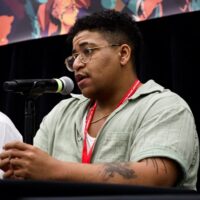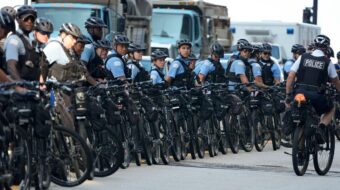
As the Trump administration guts worker protections, breaks unions, undermines the Constitution, and escalates its attacks on oppressed communities, the Coalition of Black Trade Unionists is strategizing on how best to continue in its historic role as a bridge between the labor and civil rights movements.
The members of the CBTU are gearing up for their 54th International Convention later this month in Orlando, which will meet under the theme “Preserving and Building on Our Legacy: Unbought, Unbossed, Unstoppable.” Hundreds of Black labor leaders and rank-and-file activists will gather in Florida amid what many describe as an existential moment for the labor movement.
Michael Joseph, a retiree from UAW Local 600 and president of CBTU Detroit, recently told People’s World that the group is part of the “giant fabric of working people fighting for justice and upholding our Constitution.”
Joseph said that “CBTU all over the country stands with our brothers and sisters under attack.” He argued that it is the labor movement which must stand up for democracy because “the bosses won’t.” Joseph said, “We have to do it. We are the people, and we are the power.”
The CBTU’s origins trace back to September 1972, when more than 1,200 Black union members packed Chicago’s LaSalle Hotel. Frustrated by the refusal of the AFL-CIO and its president, George Meany, to take a stand against President Richard Nixon’s campaign for re-election—a move widely seen as abandoning Black workers—the coalition’s founders declared independence from “business-as-usual” unionism.
The organization’s founding leadership was a who’s who of Black labor militants: AFSCME’s William “Bill” Lucy, United Auto Workers’ Nelson “Jack” Edwards, and Distributive Workers of America’s Cleveland Robinson, among others. Notably, Black women constituted over a third of the delegates, embedding the struggle for gender equality into CBTU’s organization from day one.
Bill Lucy, the first president of the CBTU, worked closely with the late Dr. Martin Luther King, Jr., in leading marches by striking workers during the growing Civil Rights Movement. He was also involved in launching the Free South Africa movement, which, after many years of organizing, successfully pushed the U.S. government to eventually impose sanctions on the apartheid regime.
That guiding principle of working-class solidarity manifested dramatically in 1981, when CBTU helped initiate the historic Solidarity Day March. The organization mobilized thousands of Black trade unionists to take part in the giant national demonstration against President Ronald Reagan’s firing of striking air traffic controllers and his busting of their union, PATCO.
That solidarity resurfaced again and again, especially at the international level. Throughout the 1980s, as previously mentioned, CBTU played an important role in fighting South African apartheid and building trade union solidarity with South African workers.
In 2024, delegates at CBTU’s 53rd convention in Houston approved a pro-Palestine resolution demanding an immediate Gaza ceasefire and an arms embargo on Israel—a move that placed the group at the vanguard of labor’s peace movement.
Lisa Skeete, a CBTU Region 1 delegate, told People’s World at the time that it’s “important for labor to stand up for workers everywhere… We need to recognize that there are workers in Palestine fighting for the same things. We need international solidarity.”
CBTU maintains labor’s fighting spirit
With the uncertainty that lies ahead, given the Trump administration’s attacks on labor and democratic rights, many trade unionists have described the current situation as a “state of emergency” for the labor movement.
The cuts made by Elon Musk’s “Department of Government Efficiency” (DOGE) to public agencies like the National Labor Relations Board and the Consumer Financial Protection Bureau—in service of weakening labor and consumer protections to pay for massive tax cuts for the capitalist class—along with the attacks on diversity, equity, and inclusion (DEI) and the increase in anti-immigrant rhetoric and deportations all pose a threat to the working-class unity that CBTU has been building for the past half-century.
Yet veterans of the movement remain defiant and optimistic. CBTU International President Terry Melvin at the organization’s 52nd Convention in New Orleans, said: “They told us in 1972 that we wouldn’t survive for five years…and we were not supposed to be relevant, viable, and still powerful independent voice of Black workers in 2023.
“But here we stand, dammit. I’m going to tell all those who are listening… I’m going to stand up for what is just, for what is right.
“We are told Black resistance is a threat to the white privilege or comfort zone. Well, so be it. Not my problem,” said Melvin.
“We are not content to witness Black people not breathing, or not being allowed to learn about our ancestors’ bravery or achievements. Or not have a seat at the table where our lives and future are at stake,” he said. “No, Sisters and Brothers, CBTU don’t roll like that.”
Black workers have been the backbone of some of the U.S. labor movement’s fiercest battles historically, something those beyond CBTU’s ranks recognize as well.
Seth Anderson-Oberman, the first Black executive director of Reclaim Philadelphia and former organizer with the Service Employees (SEIU), made that point in a discussion with People’s World.
“From defeating the Confederate Army to end slavery, to the Brotherhood of Sleeping Car Porters, to the 1968 Memphis sanitation strike, to today’s battles in education, healthcare, and service work,” he said. “These weren’t just labor fights—they were fights for dignity, for democracy, and for survival.”
He added: “In this moment, when Trumpism threatens to strip away hard-won rights, dismantle unions, and roll back civil liberties, Black labor is once again leading the charge. Not just in resisting authoritarianism, but in building a new vision rooted in solidarity, equity, and working-class power.”
For more information on the CBTU’s 54th International Convention, please visit their website here.
Stay tuned for more People’s World coverage of the upcoming CBTU Convention in Orlando.
Eric Brooks contributed material for this story.












